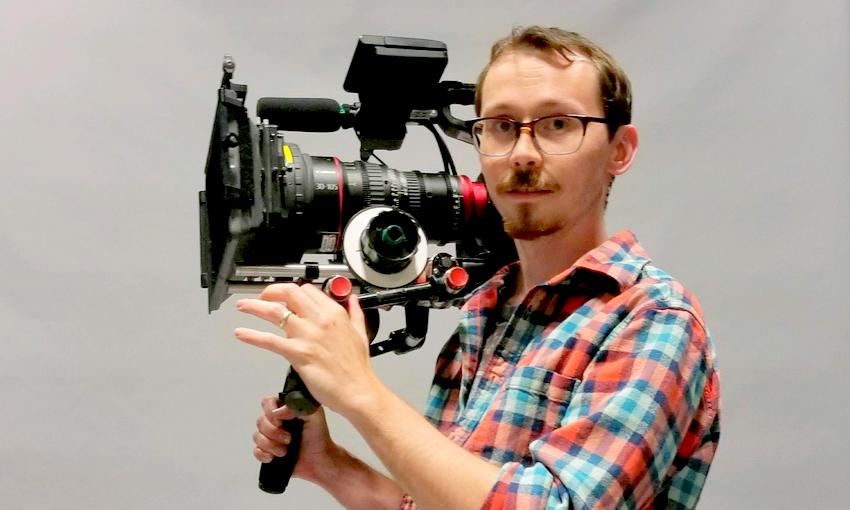
indieactivity: Give a background of your personal experience with the story, writing, production and marketing
Josh Stifter: I started filmmaking as an animator. One of my first jobs was making animations for Kevin Smith with insanely fast turn around times. This taught me to work fast and push myself to not stop until it’s done. With animation, I was also able to teach myself framing, lighting, characters, color, writing, and every part of the process that goes into live action.
The big difference is that with animation you can do almost anything. So you’re not being put in a box and finding ways to make it work. I found the transition into writing, producing, and marketing live action to be EASIER than animation because it takes less time, you have to work inside of the real world and just find the best way to do something, and you also can be much more collaborative.
Rebel Without a Crew Filmmaking by 7K & Josh Stifter
I’ve written and directed nearly 50 animations, a dozen short narrative films, and worked professionally as a director for curriculum based videos for a few years. While this was my first feature, I prepared myself since I was a kid by just making things and seeing how they work and what I like/don’t like about them.
indieactivity: Did you start writing with a cast in mind?
Josh Stifter: When I started writing, the only thing I knew I was going to make the staple of the film was the lead character Father Gil. I knew he’d be played by my best friend/co-writer Daniel Degnan. If everything else fell apart, at least we would be able to go to Austin, have some laughs, and make fools of ourselves in front of a reality crew. Luckily, we were able to find an absolutely amazing cast who instantly became like a family. Every day I was allowed to spend with them was a fucking joy!
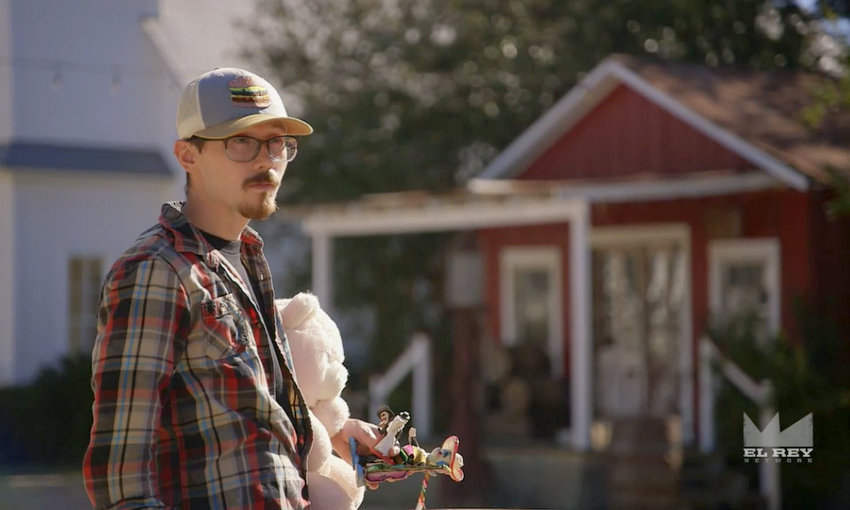
Josh Stifter as seen on Rebel Without a Crew on El Rey Network
indieactivity: How long did you take to complete the script? (Do you have a writing process?)
Josh Stifter: When I heard about Rebel Without A Crew, the website we needed to “have a finished script”. I didn’t. Instead, I immediately starting writing. They needed the script about two weeks after I started, so I wrote as fast and furiously as I could. I first laid out every scene I knew I wanted to do on notecards, which was about 20 scenes. A killer Teddy Bear. An evil record player. A scene in hell. A scene with tentacles coming out of a man’s mouth. All of theses scenes were just ideas but no definitive place in the movie. i just laid them out on the floor and started finding ways to connect them. After two weeks, I had a script done and 43 notecards ready to be made into a film!
indieactivity: When did you form your production company – and what was the original motivation for its formation?
Josh Stifter: Flush Studios started in high school. It wasn’t an “official” company, but I treated it like a production company. A few years ago, I made it official and started an LLC because I was getting enough contract work, I thought it was time to form a solo LLC. Since then, I’ve done quite a bit of contract work, including social media ads for CNN, animation for live productions, commercials, and more.
indieactivity: What was the first project out of the gate?
Josh Stifter: I’ve been making films since I was 6. It’s hard to say what my first real “project” was, but the reason I created Flush Studios LLC was because the filmmaker Kevin Smith gave me the opportunity to animate Smodco Cartoons, based off of his fantastic podcast Smodcast. From there, I worked with Kevin on a few other projects including a few animations for his movie TUSK, which you can see on the BluRay. Kevin inspired me to try filmmaking and with the jobs he gave me, I was able to buy equipment I needed to make short films and animations.
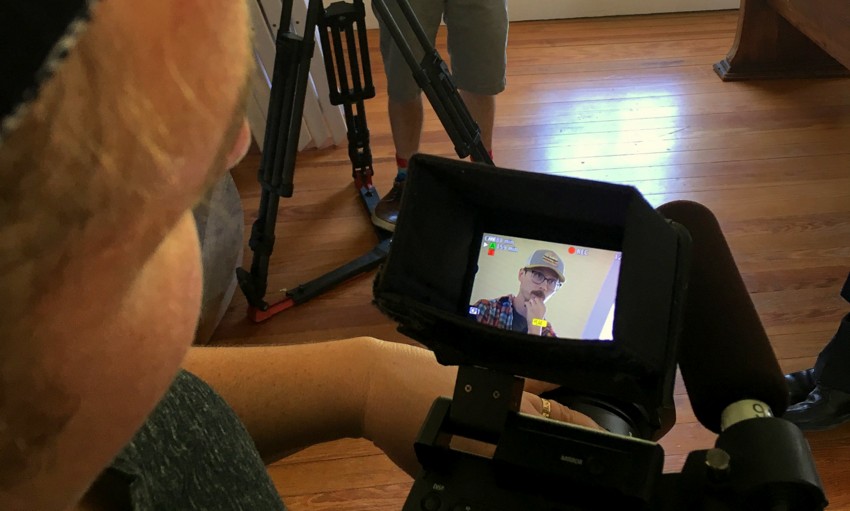
Josh Stifter is a stand in actor, while a camera man frames a shot
indieactivity: During production, what scene (that made the cut) was the hardest to shoot?
Josh Stifter: The opening sequence of the film was definitely the most difficult. It was a night shoot which instantly adds a level of difficulty when you’re not used to it, but also, the scene was meant to take place outside and a terrible storm rolled in that evening. I quickly rewrote the scene and shifted it into living room. Because of the very abrupt shift, I ended up deciding while we were filming that I would make the cold open look like old horror film footage, just to make it more fun for me to shoot and also tie the multimedia style of the film all together from the beginning.
indieactivity: What works better in this latest production that mightn’t have worked so well in the last one you did?
Josh Stifter: The best part of this project was the fact that I could focus all of my attention on it. I wasn’t working a full time job, raising two kids, and trying to maintain my house while working on The Good Exorcist. Instead, I gave 100% of my focus for the three weeks to this movie. On past films, it was just impossible; but this experience taught me the importance of dedicating oneself entirely to the goal of crafting the best movie possible, even in difficult situations.
indieactivity: You produced and directed the film, what measure of input did it take to don these hats?
Josh Stifter: I produced, directed, wrote, shot, edited, did VFX, and did sound design for my feature, along with animation, scheduling, location scouting, etc. The only way this project could actually get finished is if I took full control from the beginning and wore as many hats as I could. It not only made me feel 100% attached to the project, but also allowed me creative freedom to collaborate with whoever I wanted. If a cast member had a good idea, we rolled with it! My motto is “nothing is sacred.” Not falling in love with any little idea afforded me the chance to continuously improve the movie and make it the best $7k movie it could be.
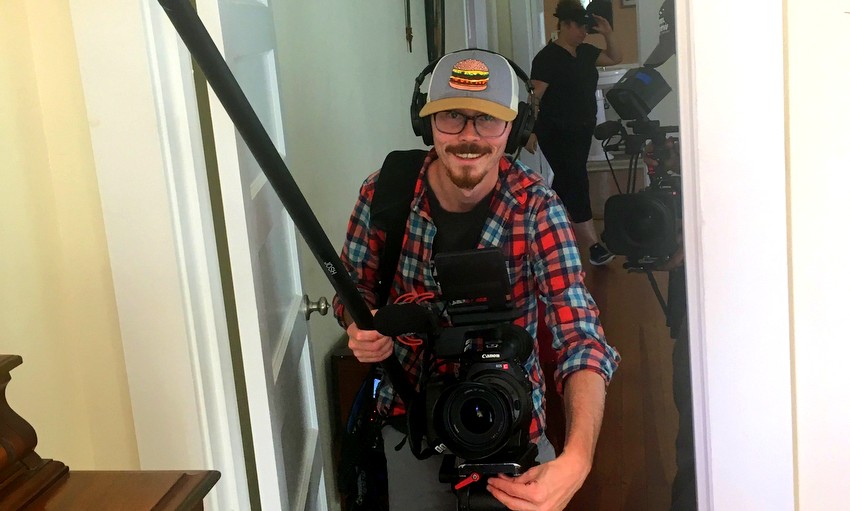
Josh Stifter shooting and holding a boom mic all at once
indieactivity: Is there anything about the independent filmmaking business you still struggle with?
Josh Stifter: I love independent filmmaking. The obvious struggle is finding the time and money to do it. Not necessarily when it comes to funding the projects, but rather paying to keep a roof over my kids head and food on the table. Trying to continue to remain motivated with a full time job, student loan debt, and maintaining your sanity is obviously tough. Finding pleasure in what you’re doing though is the key! Love your work and why you do it.
indieactivity: Where do you think your strengths lie as a filmmaker?
Josh Stifter: My strengths definitely lie in my motto “Nothing is sacred”. As an indie filmmaker you have to learn to adapt. Almost nothing is going to go your way. But you can make it go in a different positive way you didn’t expect. Where your limited in funding, time, and resources, you can make up in creativity and the fact that you likely don’t have a ton of producers telling you what to do. Indie filmmaking should be collaborative, fun, and creative. That’s why we do it, right?
indieactivity: Let’s talk finance, How did you finance the film?
Josh Stifter: We created the film for Robert Rodriguez’s show Rebel Without A Crew, in which he gave us $7,000 to shoot a feature in 14 days.
indieactivity: How much did you go over budget? How did you manage it?
Josh Stifter: I did not go over budget. In fact, in the end I came in under budget and then was able to put extra money towards score, paying my cast, a really fun poster, and a few other visual effects I couldn’t do myself. The real trick is to write a movie you think you can make for no money. From there, everything is gravy!
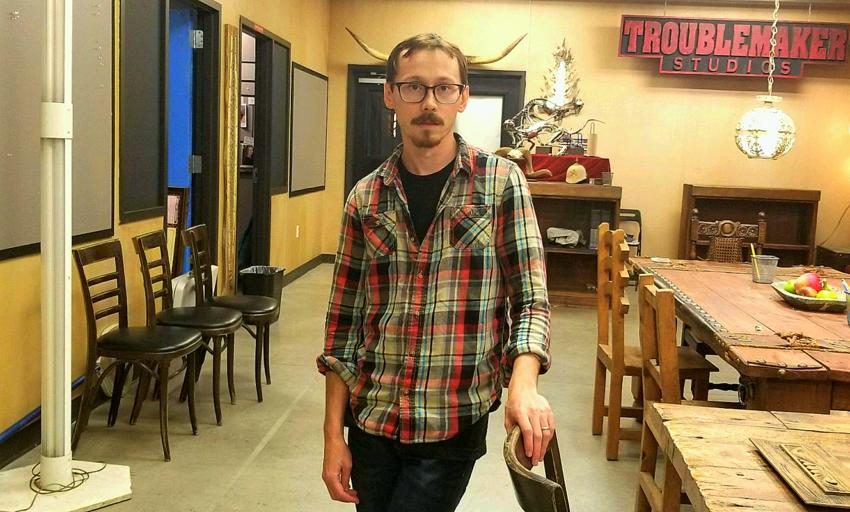
Josh Stifter in Robert Rodriguez’s Troublemaker Studios
indieactivity: How important is marketing? Do you think a project can make any dent without it these days?
Josh Stifter: Marketing is incredibly important, but not as important as just getting the project seen. People put a lot of stock into social media marketing these days. Yes, it’s true that it’s a key element, but actually taking the movie out, watching it with people, interacting, and becoming a part of a community can be just as, and possibly more, important than a big social media campaign. You don’t want people to just know your movie exists; the key is to make people feel something for it.
indieactivity: Can you tell us about your marketing activities on the project – and how it’s gone for you?
Josh Stifter: The movie is really just in the early stages of wrapping up, but so far I’ve really pushed to get the word spreading by being active on social media and also starting a grassroots/word of mouth campaign to locally get people talking about it. My real goal is just to get as many eyes on the film as possible. I want people to see this insane project. I treated this project like film school, since I never was able to go. What I’m hoping is just that people see it for what it is and can enjoy not only the movie, but the dedication that went into it.
indieactivity: What do you hope audiences get from your film?
Josh Stifter: I hope they feel inspired. Whether they like it or not, I hope they watch it and say, ‘This makes me want to make cool shit!’ I also hope they laugh at the Killer Teddy bear…
indieactivity: What else have you got in the works?
Josh Stifter: I’m running a Patreon site where I’ve been posting podcasts, behind-the-scenes of my films, short films, animations, and more. I also just finished writing my second feature “Greywood’s Plot” which I hope to debut exclusively on my Patreon. I’m also in talks with Alejandro and Scarlet about potentially working on some stuff together as well. Always keep irons in the fire so you can strike them when the moment feels right.
Apple TV picks up “Dismissed” by Aysha Scott After it Hit a Million Views
Single mother entrepreneur from South-East London, built up an empire from scratch.
MOEDER Oscar® Qualified Drama Based on MH17 Airline Disaster
OSCAR® Qualified MOEDER tells a story tragedy on the Ukrainian-Russian border
Nate & John Oscar® qualified Animation Short Directed by Jumai Yusuf
NATE & JOHN heartwarming animation short qualifies for the 97th Academy® Awards
Dreama Team by Chad Weber & Steve Vanderheide Acquired by Freestyle for November Release
Feature Documentary Dreama Walton Sets Digital Debut for Global VOD Platforms and on DVD on Nov 1, 2024
LGBTQ+ Film, “Muscat” by Philippe Grenier Qualified the Oscars®
Muscat is an audacious exploration of a young boy confronted with the discovery of his identity
Joy of Horses by Ava Justin acquired by BMG Global
Joy of Horses by Ava Justin, now available across digital streaming platforms
Vanessa Valente Talks Reality TV, Online Bullying and Healing on Sisters Uncensored Podcast
The Temptation Island’s reality TV star joins Sisters Uncensored Podcast October 16th
Oscar® qualifying Sunflower: A story of resilience in a war-torn country
Mateusz Balcerek’s Oscar® qualifying Sunflower is an extraordinary story of resilience in a war-torn country









